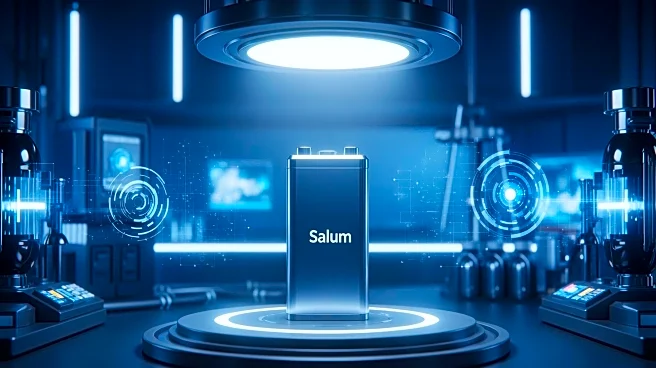What's Happening?
Recent research has made significant strides in developing sodium-based solid-state batteries, which offer a cheaper and more environmentally friendly alternative to lithium batteries. The study, led by
Y. Shirley Meng at the UChicago Pritzker School of Molecular Engineering, has successfully created a sodium battery that performs reliably from room temperature to below freezing. This breakthrough stabilizes a metastable structure of sodium hydridoborate, enhancing ionic conductivity significantly. The research aims to address the scarcity and environmental impact of lithium mining, presenting sodium as a viable option for energy storage solutions. The study's findings could facilitate the transition from laboratory research to industrial production, potentially revolutionizing the battery industry.
Why It's Important?
The development of sodium batteries is crucial as it addresses the environmental and economic challenges posed by lithium mining. Sodium is more abundant and less harmful to extract, making it a sustainable alternative. This advancement could lead to more affordable and eco-friendly energy storage solutions, benefiting industries reliant on batteries, such as electric vehicles and renewable energy storage. The ability to produce sodium batteries alongside lithium ones in gigafactories could diversify the energy storage market, reducing dependency on lithium and mitigating its associated environmental issues. This shift could have significant implications for the U.S. energy sector, promoting sustainability and innovation.
What's Next?
The research team plans to further explore the scalability of sodium battery production, aiming to transition from laboratory findings to industrial applications. This involves refining the manufacturing processes to ensure economic viability and efficiency. As the technology progresses, it could attract interest from battery manufacturers and industries seeking sustainable energy solutions. The potential for sodium batteries to compete with lithium in terms of performance could lead to increased investment and development in this area, fostering advancements in energy storage technology.
Beyond the Headlines
The shift towards sodium batteries could have broader implications for global energy policies and environmental strategies. As countries strive to reduce carbon emissions and promote sustainable practices, sodium batteries offer a promising alternative to traditional lithium-based solutions. This development could influence regulatory frameworks and encourage investment in green technologies, aligning with global efforts to combat climate change and promote environmental conservation.









